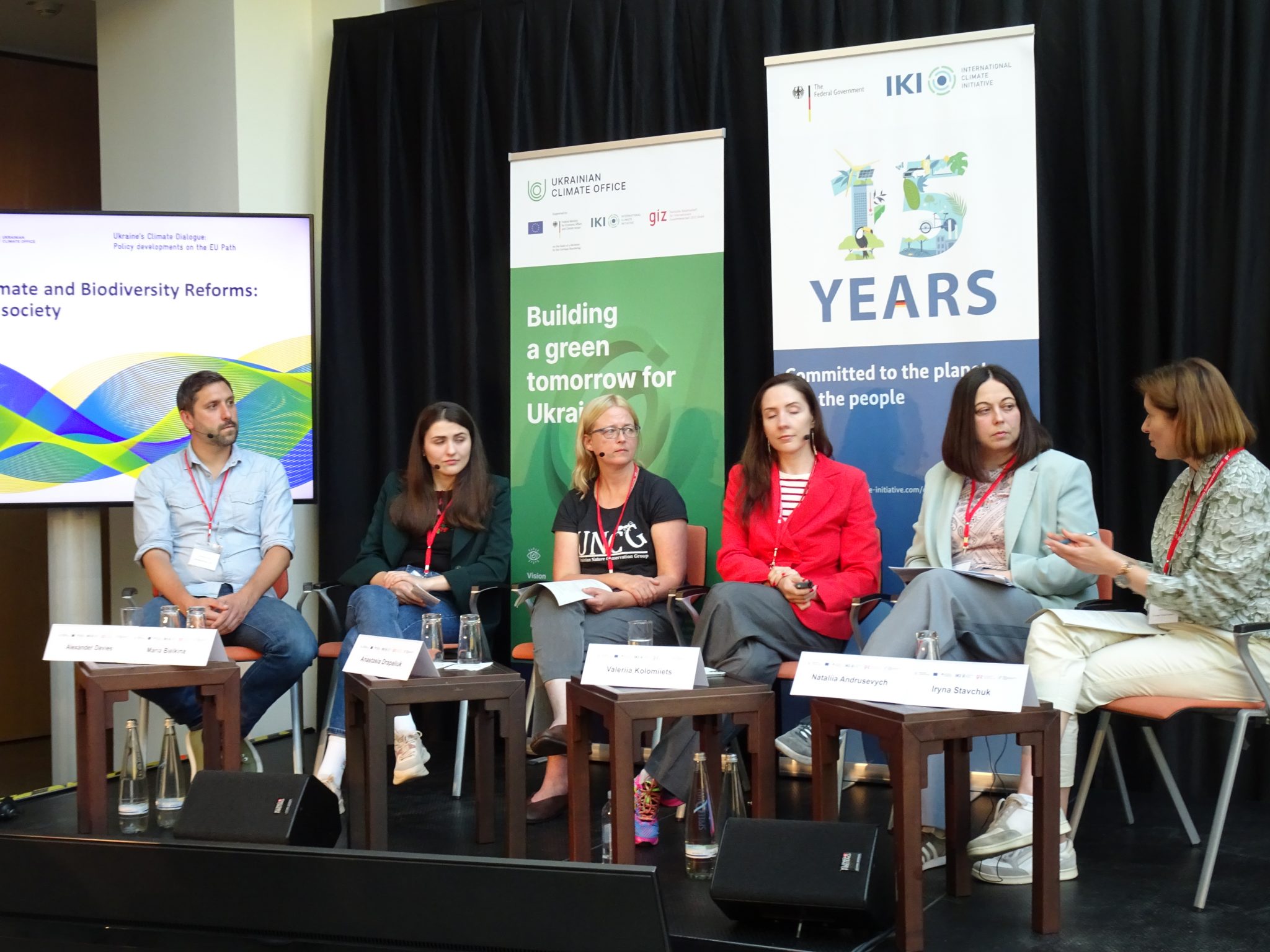Ukraine's Climate Dialogue: a closer look into the Role of Civil Society

One goal of the Ukraine’s Climate Dialogue was to drive the Climate and Biodiversity topic and discuss the Role of Civil Society, Foundations, and Think Tanks in Ukraine. The panelists addressed a wide range of topics. They discussed amongst others the opinion of Ukrainians on climate policy measures, the protection of forests, nature conservation areas and their management, the influence of agriculture and the use of fertilizers, as well as the impact of climate change on displaced people and how reconstruction could already take climate aspects into account.
Watch full recording of the event
The 3rd panel of the Ukraine’s Climate Dialogue was “bringing us down to earth ” and showed “what we have to do on an everyday basis”, as Margot Wallström from the High-Level Working Group on the Environmental Consequences of the War summarized it when she thanked the panelists afterwards.
During the URC, topics such as climate, environment, and biodiversity only played a subordinated role. Therefore, one goal of the Ukraine’s Climate Dialogue was to give these topics more room. The 3rd panel was entitled “Driving Climate and Biodiversity Reforms: The Role of Civil Society, Foundations, and Think Tanks in Ukraine” and offered representatives of 5 different civil society organizations a platform to present their work on the ground.
Representatives from the Resource and Analysis Center “Society and Environment”, WWF Ukraine, the Nature Protection Fund, the NGO Ecoaction, as well as the Norwegian Refugee Council were present at the event. The panel was moderated by Iryna Stavchuk from the European Climate Foundation.
The panelists addressed a wide range of topics. They discussed amongst others the opinion of Ukrainians on climate policy measures, the protection of forests, nature conservation areas and their management, the influence of agriculture and the use of fertilizers, as well as the impact of climate change on displaced people and how reconstruction could already take climate aspects into account. The overarching question was how to mainstream climate considerations in practical, on-the-ground-work.
A study presented by Nataliya Andrusevych from the Resource and Analysis Center “Society and Environment” shows that Ukrainians give climate change a significant role in politics despite the threat of Russia’s full-scale invasion. They are open to climate policy measures and wish to be well informed about climate and environmental matters. However, support for climate policy measures is limited when it comes to personal finances or when prices could rise, reflecting the poverty situation in which many Ukrainians currently find themselves. Therefore, the aim should be to develop a good communication strategy for climate-related topics that involves people and thereby supports the government in implementing climate policy measures. The study, financed by the Ukrainian Climate Office, will be presented in the end of July to a wider audience.
In the field of environmental and nature conservation, a major challenge is the low institutional capacity right now. According to Anastasia Drapaliuk from the Nature Protection Fund, there are major staff shortages and an expected further staff turnover due to low salaries in this sector. The low institutional capacity is caused by a lack of funds, as the government is currently unable to invest. The absence of tourism since the Covid-19 pandemic and now because of the ongoing war has further aggravated the budget deficit. Valeriia Kolomiiets from WWF Ukraine is as well calling for increased protection of forests, emphasizing their importance as a source of income for local communities and the use of timber for heating. When asked about the restoration of Kakhovka Hydropower Plant in the previous format, Ms. Drapaliuk referred to the observation that young forests are already growing in the affected area and recommended the establishment of a nature reserve instead of the restoration.
In the area of agriculture, Ukraine is currently struggling with landmines on and pollution of agricultural land due to the war and the impacts of climate change. The NGO Ecoaction is addressing the challenge of climate change mitigation and has set the goal to increase the efficiency of fertilizer use, which would at the same time reduce the dependency on fossil fuels, as Maria Bielkina explained. This is also intended to be a next step towards EU Accession, namely the implementation of the Nitrate Directive. Ecoaction is also supporting farmers in their efforts to adapt to global warming to ensure the predictability and stability of harvests to improve food security.
In the humanitarian aid sector, it goes without question that the focus must first be on people’s needs. Nevertheless, the Norwegian Refugee Council is already trying to integrate climate action into the reconstruction process. “The most environmentally friendly response is often the best humanitarian response,” states Alexander Davies and points out that climate-friendly solutions often have additional positive outcomes, such as improved security and economic benefits, if one considers the entire pay-back period.
All panelists agreed that climate and biodiversity considerations should be integrated into post war recovery planning and implementation. The aim should be to “link our recovery needs with our conservation needs” as Valeriia Kolomiiets from the WWF states. The represented organizations are already working on mainstreaming climate and environmental aspects in all their actions and are constantly incorporating these into their policy advice.
In her conclusion, Margot Wallström once again emphasized that these civil society actors that do the work on the ground are particularly important and that funding governments should “look at these things that are not so visible but still need our funding, still need our help.”
The event was jointly organized by Ministry of Environmental Protection and Natural Resources of Ukraine and Ukrainian Climate Office within Capacities for Climate Action project (C4CA) Project implemented by GIZ and commissioned by the German Federal Ministry for Economic Affairs and Climate Action (BMWK) under the International Climate Initiative (IKI) and co-funded by the EU.